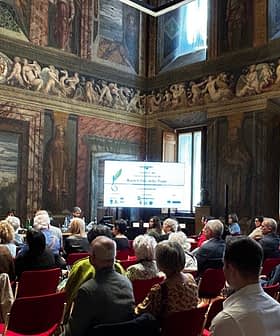Xylella Fastidiosa Could Be Contained With Better Monitoring
New data from the Sbarro Health Research Organization suggest that even 100 percent compliance to the present uprooting containment strategy would only partially stop the spread of Xyella fastidiosa in Italy.
 Workers cut down an olive tree infected with Xylella fastidiosa near Brindisi, southern Italy. Photograph: Gaetano Lo Porto/AP
Workers cut down an olive tree infected with Xylella fastidiosa near Brindisi, southern Italy. Photograph: Gaetano Lo Porto/APA new study by Enrico Bucci from the Sbarro Health Research Organization (SHRO) suggests that the current strategy for monitoring Xylella fastidiosa fails to identify all the infected plants and enables progression of the epidemic via undetected infection hotspots.
The data revealed in Bucci’s report on the effectiveness of current measures could prove vital for the fine-tuning of an effective containment strategy; which due to the lack of a cure for Xylella offers the best chance of stopping the disease in its tracks and preserving both the traditional landscapes of the impacted Mediterranean countries and their economies.
Bucci told Olive Oil Times that data shows there is a failure in the current disease monitoring strategy. He believes the weakness can be attributed to the way in which trees are sampled. Whilst the current focus is on trees displaying symptoms; most newly infected plants are usually symptom-free and therefore escape detection.
Having undetected infected plants means the infection could be present without people being aware of this and if this occurred in a zone without mandatory containment measures in place the infection would spread.
To effectively contain the disease the identification of infected trees in previously uninfected regions must be followed up with appropriate containment measures such as uprooting infected plants and fighting the insects responsible for spreading the bacterial infection.
“Having undetected infected plants means the infection could be present without people being aware of this and if this occurred in a zone without mandatory containment measures in place, the infection would spread,” Bucci said.
Bucci’s report states that 98 percent of infected olive trees cluster in spots within a 100-meter (109-yard) radius; which rationalizes the current strategy of uprooting and destroying all trees located in a 100-meter radius of newly detected infected plants.
See Also:Xylella fastidiosa NewsHowever, the scientist believes that current monitoring misses many infection hotspots and in order to effectively contain the epidemic the identification of infected plants in previously unaffected regions is necessary. Bucci said that even 100 percent compliance with the present uprooting containment strategy would only partially stop the spread of the disease.
“Containing the epidemic requires infection hotspots to be identified, as this is the only way to both measure the efficiency of our policies and to apply uprooting [which is necessary to lessen the inoculum pressure in the newly colonized area],” he said.
Bucci spoke of the need for greater investment in monitoring to prevent dire consequences adding, “if infected plants escape detection, they cannot be uprooted, and the infection cannot be contained.”
However, he abstained from laying blame for the spread of the disease on anyone.
“Phytosanitary officers are fighting a vast epidemic with scarce resources, and the monitoring protocol is a compromise between available money and staff from one side and the necessity to sample as many plants as possible from the other side,” he said.
Bucci believes that in any monitoring strategy, some infected trees will not be detected due to unavoidable errors coupled with infection hotspot trees that escape uprooting due to delays in applying the law as a result of bureaucracy and people’s hesitancy among other reasons.
The scientific community has generally concluded that uprooting alone would fail to contain the epidemic and as part of the current containment strategy weeding and insecticide treatments to fight the bacteria are mandatory.
Bucci told us that unless an effective cure is developed we must focus on containment of the infection. He also said that he supports the current policies of herbicide and insecticide treatments, which currently have no valid alternative.
The Xylella expert also offered his advice for more effective containment of the disease.
“First and foremost is the need to quickly and correctly apply all the mandatory containment measures,” he said.
Secondly, he called for improvements to the current monitoring protocol, “in particular by sampling trees following a predetermined statistical scheme, instead of relying on arbitrary selection by staff.”
Finally, he warned people against the use of scientifically unproven remedies and recommended only the use of remedies approved by reputable scientific bodies, such as the European Food Safety Authority (EFSA).
Ministers are currently on summer holidays, but the bacterium is not, and new infection hotspots were recently announced.
Bucci said it may be necessary, “to eventually replace sensitive cultivars with more tolerant and resistant ones, as has been done in the past for other plant diseases.”
The scientist told Olive Oil Times he no longer believes 100 percent eradication of the disease is a possibility although it could have been achieved if all containment measures had been followed in the early days.
“We may think to keep the disease under control, especially after the identification of appropriate remedies such a cure or resistant cultivars; but we know that even most human pathogens were never entirely eradicated anywhere, and this is also true for plant pathogens,” he said. “As in any Darwinian struggle between a host and its parasites, we need to change to resist and survive. We can’t expect Xylella to stop naturally.”
Bucci stated his opinion that the Italian government had not done enough to either halt the spread of the disease nor help Italian olive growers and added that whilst laws were signed, money allocated and solutions announced; the crude facts told a different story.
“Ministers are currently on summer holidays, but the bacterium is not, and new infection hotspots were recently announced,” he said.
Bucci was particularly critical of the handling of the situation in Puglia.
“Apulian governor Emiliano was continuously contradicting himself, oscillating from conspiratorial positions to vocal activism. In the meantime, the term established for mandatory eradication by the regional agencies in charge of more than infected 300 plants has passed, and for more than 500 others is approaching.”
The scientist also thought that regional offices were often paralyzed by bureaucracy and frequently delivered confusing information to the public.
Xylella fastidiosa first appeared in the olive groves of Puglia in 2013 and went on to destroy 445,000 acres of Italy’s olive groves before spreading to the Balearic Islands, Spain, France, Portugal and Israel, sparking fears it could reach as far as Africa, Australia and East Asia.
Whilst efforts to keep the epidemic under control have largely failed and a cure has yet to be found; an organic treatment combined with good agricultural practices was believed by some to have shown promise during a three year trial in Lecce although Bucci did not agree with this.
Italy-based Bucci works as an independent expert for the analysis of scientific data and is an adjunct professor at Philadelphia’s Temple University. He is also affiliated to the Sbarro Health Research Organization.








